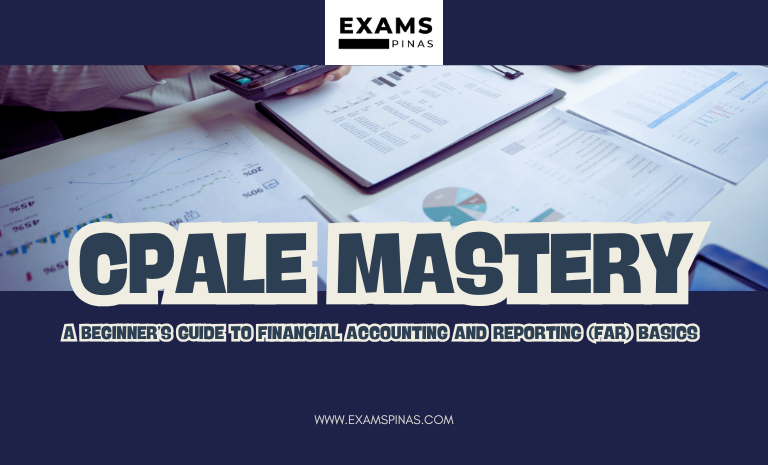Preparing for the Certified Public Accountant Licensure Examination (CPALE) in the Philippines can be challenging—especially when it comes to Financial Accounting and Reporting (FAR). As one of the most comprehensive and heavily weighted subjects, mastering FAR is essential for aspiring CPAs who aim to pass the exam on their first try.
In this guide, we’ll walk you through the FAR basics, its scope and coverage, and study tips to help you build a solid foundation for success.
What Is Financial Accounting and Reporting (FAR)?
Financial Accounting and Reporting (FAR) is one of the core subjects in the CPALE, designed to test your understanding of financial reporting principles, accounting standards, and the preparation of financial statements for different entities.
In simpler terms, FAR measures how well you can record, summarize, and present financial information according to accepted accounting standards.
Coverage of FAR in the CPALE
The CPALE Financial Accounting and Reporting subject covers a wide range of accounting topics. Below are the major areas you need to focus on:
1. Conceptual Framework and Accounting Principles
- Understanding the Conceptual Framework for Financial Reporting
- Objectives and qualitative characteristics of financial statements
- The accrual basis of accounting, going concern, and consistency principles
2. Financial Statements Preparation
- Components of financial statements under PAS 1 (Presentation of Financial Statements)
- The Statement of Financial Position, Income Statement, Cash Flow Statement, and Statement of Changes in Equity
- Understanding Notes to Financial Statements
3. Accounting Standards and Applications
- Philippine Financial Reporting Standards (PFRS) and Philippine Accounting Standards (PAS)
- Accounting for assets, liabilities, and equity
- Measurement, recognition, and disclosure requirements
4. Business Combinations and Consolidation
- Concepts under PFRS 3 (Business Combinations)
- Preparing consolidated financial statements for parent and subsidiary companies
- Elimination entries and non-controlling interests
5. Special Topics
- Foreign currency transactions
- Leases (PFRS 16)
- Revenue recognition (PFRS 15)
- Financial instruments (PFRS 9)
- Investment properties (PAS 40)
Understanding these key areas helps you grasp the full scope of FAR and identify where you need to spend more study time.
Why FAR Is Important in CPALE
FAR is often called the “heart of accounting” because it forms the foundation for most other CPA subjects such as Advanced Financial Accounting, Auditing, and Management Advisory Services.
Strong FAR skills allow you to:
- Prepare accurate and compliant financial statements
- Analyze a company’s financial health
- Understand real-world accounting applications
- Develop confidence for other CPALE topics
Study Tips for FAR Beginners
Getting started with FAR can be overwhelming, but these tips can make your preparation more efficient and effective:
1. Master the Basics First
Before diving into complex topics, ensure you understand the accounting cycle, journal entries, and adjusting entries. These fundamentals will make advanced topics easier to comprehend.
2. Learn the Standards Gradually
Don’t try to memorize all the PFRS at once. Study one standard at a time and relate it to practical examples or case studies.
3. Practice Problem-Solving Daily
FAR requires computation and analysis. Practice solving problems from review materials and past CPALE exams. Time yourself to simulate real exam conditions.
4. Create Summary Notes
Summarize each standard and key concept in your own words. This helps with retention and quick review before the exam.
5. Join CPA Review Communities
Engage with other CPA aspirants through online communities, review centers, or forums. Sharing tips and resources can boost motivation and understanding.
Common Mistakes CPALE Examinees Make in FAR
Even diligent students can make errors. Avoid these common pitfalls:
- Memorizing without understanding the logic behind accounting standards
- Ignoring theoretical concepts in favor of computation-only practice
- Failing to update notes with revised PFRS/PAS
- Rushing through journal entries without verifying accuracy
Resources to Help You Study FAR
Here are some recommended resources to supplement your FAR review:
- CPALE Review Books (e.g., Valix, Millan, Dayag)
- Philippine Institute of Certified Public Accountants (PICPA) updates
- PFRS and PAS documents from the Accounting Standards Council
- Online accounting tutorials and problem drills
Final Thoughts: Build a Strong Foundation Early
Mastering Financial Accounting and Reporting (FAR) is a crucial step toward your CPALE success. By starting with the basics, studying consistently, and understanding the principles behind every standard, you’ll gain the confidence needed to tackle even the toughest FAR problems.
If you’re preparing for the CPALE in the Philippines, visit Examspinas.com for updated guides, reviewer tips, and exam coverage breakdowns designed to help future CPAs like you achieve your dream.

